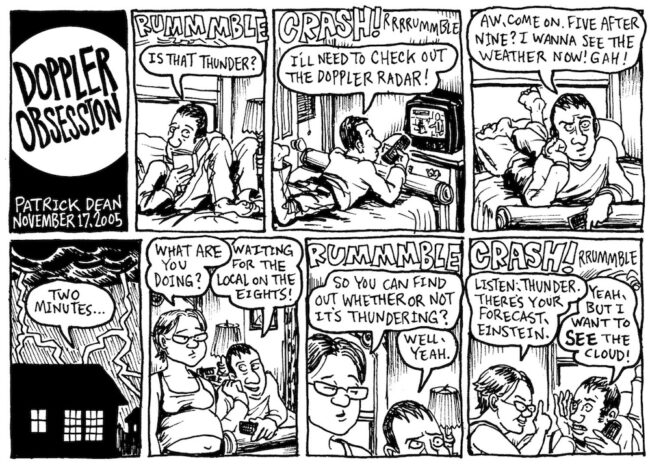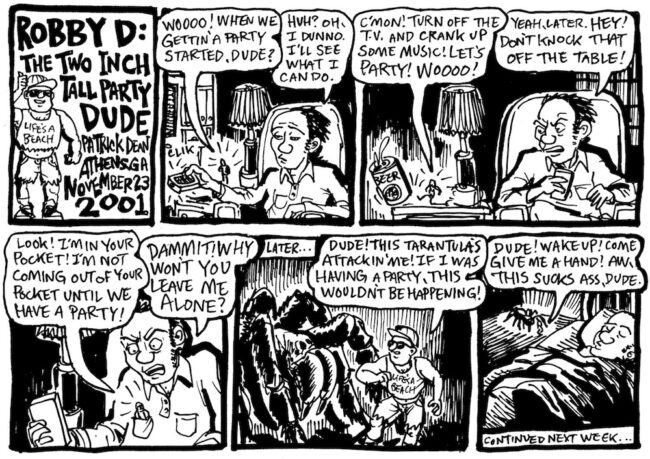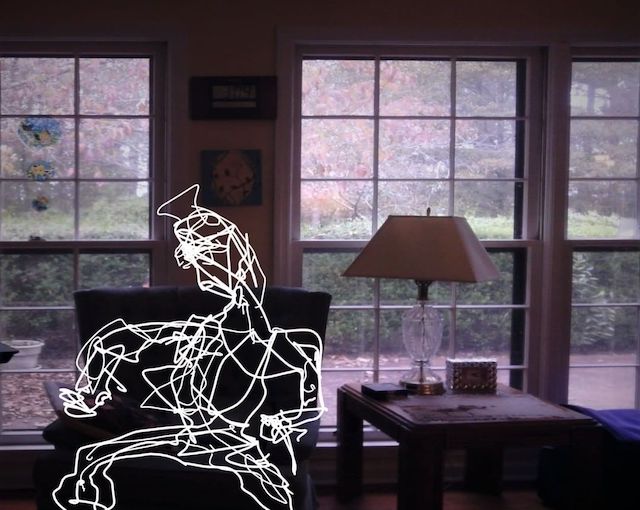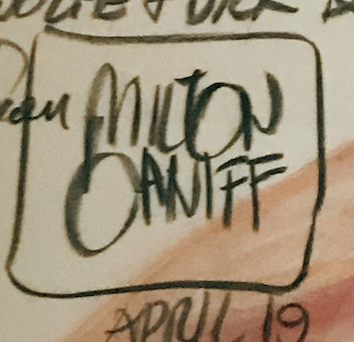 I had the privilege to interview my friend Patrick Dean about his new graphic novel Eddie’s Week (out now from Birdcage Bottom Books), as well as his long running weekly strip Big Deal, being the co-organizer of FLUKE Minicomics Festival, his battle with ALS and his recent political work.
I had the privilege to interview my friend Patrick Dean about his new graphic novel Eddie’s Week (out now from Birdcage Bottom Books), as well as his long running weekly strip Big Deal, being the co-organizer of FLUKE Minicomics Festival, his battle with ALS and his recent political work.
This interview was taken from a virtual event with Avid Bookshop, which you can now see on youtube. The event featured readings of Patrick’s work and guest comics-scholars Hillary Brown and Robert Newsome. - Eleanor Davis
Eleanor Davis: Your work is extremely alive - it has tremendous energy. Can you tell me about what it is that you look for in one of your own drawings?
Patrick Dean: I grew up being attracted to the most slapstick friendly cartoonists who put a lot of energy and gestures into their artwork. Cartoonists who used the full advantage of what a cartoon could do with breaking the laws of physics when reacting to something absurd. Most of the mad magazine artists like Bill Elder, Jack Davis and Sergio Aragones would draw these magnificent panels with so much movement and life and I wanted to follow in their footsteps. I can still dial it down for quiet moments, but usually try to give it my all and loosen up.
I love that you can see that in your work - I think any comics aficionado would look at the way you draw feet and know that you were a Jack Davis Fan. I grew up reading early MAD magazine as well, and I definitely get the same joy pouring over your comics that I did pouring over Bill Elder comics when I was a kid.
 Why would you say you love comics so much? This can be a personal-history question, or an artistic/aesthetic question, or both.
Why would you say you love comics so much? This can be a personal-history question, or an artistic/aesthetic question, or both.
Comics are such a fantastic way to tell a story for its accessibility. I've admired how it can tell its message even without words – in a world divided by tongues a pantomime comic can be understood by practically everybody around the globe. Comics appear in newspapers that can be enjoyed and tossed away or collected in seventy dollar hardbacks. But I prefer its non-precious disposable qualities. It’s an artform that is rugged and can take a beating – one of the reasons I'm proud to be published by a press with the name Birdcage Bottom Books. And if you want to join the legion of comic makers you don't have to go broke on art supplies; scrap paper and a cheap ballpoint pen will suffice.
Totally - comics are a deeply proletarian artform. They’ve historically been cheap to buy, they’re cheap to make - there’s an extremely low barrier to entry to creating them.
Can I ask when you started making mini-comics, and how you got involved with FLUKE? [The zine and minicomic festival in Athens, Georgia - ED]
I had been drawing comics since junior high and had a weekly comic in The Flagpole during college, but it didn't occur to me to collect anything into a mini comic until the first FLUKE show with support from Devlin Thompson and Robert Newsome. They drove me to Kinko's and walked me through assembling a digest sized collection to sell. That was in 2002. T Edward Bak organized the first FLUKE in response to SPX being cancelled that year immediately after 9-11. Robert and I became involved helping with the show along with other Athens cartoonists and found it really important that suddenly Athens had its own mini comics and zine festival. When Bak moved to the Pacific northwest he handed it over to Robert, Devlin and I and we've been proud of how it’s grown in size without losing its integrity as a low cost one day small press show.
It was certainly important to me - I was attending SCAD and Drew [Weing] and I would drive up from Savannah to table at FLUKE. At that time SCAD didn’t have a lot of interest in alternative cartooning and I would work on minis and look forward to FLUKE all year. What has organizing FLUKE meant to you for the past - how long has it been, 18 years? God that’s a long time!
I think it’s important for people who self publish to have a venue to share their work in person and the opportunity to meet other people, some who become lifelong friends. Robert and I have made it a point also to keep the show affordable so anyone can exhibit with a table and not worry about breaking even too much. We have been appreciative of the support from the SCAD students over the years, many who table at FLUKE for the first time.
I was one of those SCAD students, and FLUKE meant the world to me. Cartooning is essentially a very solitary artform. Unlike music you make comics in isolation and you often read them in isolation. It’s hard to adequately explain how important FLUKE has been to the southeast cartooning community. People look forward to FLUKE all year.
Speaking of lifelong friends, how did you meet Devlin and Robert? (I am amazed you are able to type this well with the eye-gaze!!)
I had run into Devlin during trips to Athens to visit my brother Alan as far back as middle school, but didn't really get to know him until I moved to Athens in 1995 and visited Bizarro Wuxtry regularly. A coworker from The Flagpole, Mary Jessica Hammes, began dating Robert in the late nineties and we hit it off during a New Years party discussing records and comics. We've been pals ever since. Twenty years. At the same party I also talked to a woman I had met a few weeks earlier. We also hit it off and got married a few years later. That was how I met Erin.
I love thinking about that party, because it feels so historic, and because knowing all the people involved - you, Robert and Erin - there was a very good chance one or all of you would have gotten cold feet about going and decided to stay home and read a book instead. History would have been changed forever!
What were some of the first comics you remember reading?
An odd assortment of seventies comic books, mostly belonging to my older brother. Some superhero titles, but the comics that stuck with me were the sci-fi and horror comics from that era. House of Secrets, House of Mystery, Mystery in Space from DC, an issue of Grimm's ghost stories from Gold Key that had a terrifying cover of the specters of a hooded executioner about to behead a prisoner before a room of horrified onlookers. My brother had the oversized Star Wars treasury that adapted the movie, which we read to shreds. From marvel I was interested in any comic with the Hulk or the Thing because they were technically monsters.
One of the things I love about your work is how much you’ve been inspired by horror - you clearly love monsters and ghosts and noir, and they appear in your work constantly - I don’t think you’ve drawn more than three consecutive strips that don’t have a ghost or a werewolf or at least a yeti. But your work is so gentle - the monsters are intensely human.
What was the first indy comic you were exposed to? When you first read those Flagpole comics, was it something you thought you could be doing one day?
In middle school I was still reading Batman and X-Men, and any silver age comic from the sixties I could get my hands on, but in the late eighties all these independent publishers were popping up offering a new frontier of comic possibilities. In sixth grade I bought my first issue of Flaming Carrot comics, and I was hooked. It was surreal and funny and created by a cartoonist in Atlanta, just an hour away from my hometown of Rome. Over the years I never lost my excitement for seeing a new comic from Bob Burden. The local comic shop in Rome couldn't make heads or tails of this indie stuff and dumped it in the quarter bins. I enjoyed it all. The Ninja Turtle parody Adolescent Radioactive Blackbelt Hamsters was a favorite. A few random issues of Cerebus that confused me. And during this time DC was publishing books that would evolve into their Vertigo imprint. Meanwhile Marvel had Epic, which published creator owned titles, like Sergio Aragones's Groo the Wanderer, another favorite of mine. Through all this I still liked superheroes but these indie comics are what I envisioned doing one day. My older brother Alan sending me the local comics cut out of The Flagpole Magazine was definitely an influence. Jim Stacy, Jack Logan and Larry Tenner made me dream of being in The Flagpole one day.
I love thinking about young Patrick Dean reading Flaming Carrot! I remember finding my first Flaming Carrot also in a quarter bin somewhere and thinking “Who the heck is this FOR?” It was for you!!
Sidebar: What are your top 3 werewolf movies?
The original Wolf Man from Universal in 1941, the underrated Wolfen from the early eighties which was an HBO staple as a kid, but my favorite is an American Werewolf in London. Perfect blend of humor and horror with sympathetic characters.
What was the first kernel of Eddie’s Week for you, and how did the story develop from there? We knew you were working on this big book project for many years - what was the first step?
In college I used to draw comics in my sketchbooks, with no intention of ever sharing them. No pencils or planning, just straight to pen and ink. I did a few comics with the Eddie character as far back as 1995, featuring him and a friend hanging out, based on my underwhelming experiences in high school. When drawing comics in the coming years I used the Eddie character again but in goofier situations and eventually had him star in a comic that ran in The Flagpole Magazine for a while. The space I had in The Flagpole was a free-for-all do-whatever place to experiment every week. Early on I tried a serialized comic that went on aimlessly for a few months, but wanted to give the longer storytelling another shot. Eddie Goes to Portland was serialized for around thirty weeks featuring Eddie visiting friends in Portland, secret cults kidnapping him, venomous snakes and a phantom arm carrying a straight razor that shaves people in their sleep. It was a mess. When I drew it I had never even been to Portland. Long after I left The Flagpole I had a need to attempt a comic story spanning more than thirty pages and spent a long time building the skeleton to Eddie's Week. Early drafts were really different from the final product .
It was a delight to get to re-read all your Big Deal comics because I had totally forgotten it was Eddie in Eddie goes to Portland! In Eddie Goes To Portland he’s a writer working on a historical drama, and he’s the author of a little-known book called Great Corn-Husking Politicians of the Dust Bowl. I loved seeing this facet of Eddie.
There is so much stuff packed into Eddie’s Week, it’s a jam-packed messy surreal kitchen sink of a book. And yet by the end of the story most of the threads have been satisfyingly tied up. How did you do that??????
During the planning process of Eddie's Week I was introduced to what would become my biggest literary influence that probably kept the story from being a total trainwreck. The late great Darwyn Cooke announced he was doing comic adaptations of the Parker crime novels that Donald Westlake wrote under the pseudonym Richard Stark. Cooke talked of Westlake so highly in these interviews that I was excited to check this guy out. I quickly learned that a lot of Westlake books were either out of print or between printings and started a treasure hunt. The first book I found was The Hot Rock, the beginning of his Dortmunder series, and I was struck by how ridiculous the plot became but tied everything up by the end. I continued reading anything he wrote including the excellent Parker series and it pushed me to have as much audacity and absurdity in my story as I wanted as long as I didn't leave too many loose strings behind. Westlake made me focus on storytelling and not to be weird for weird’s sake, because the result will look forced.
This makes me think that if I found and read these Donald Westlake books I might also magically learn to write really complicated but also satisfying crime novels? Like they are this magic spell. It wasn't hard? Figuring out how to tie everything together?
It was definitely work. I have sketchbook pages of mapped out plot points trying not to leave anything hanging, but not getting bogged down over-explaining, and computer word files with multiple outlines that I shot down. I wanted to charm the reader but not frustrate them.
I think charming is a perfect descriptor of the book. It charmed the pants off me.
Eddie’s Week packs in a lot of emotions: it’s bust-a-gut funny, weird, and also melancholy, addressing feelings of isolation and directionlessness. But it’s also very gentle and ultimately humane and loving. Was it difficult to balance all these contrasting emotions? Did you ever think it was veering into too dark, or too comedic?
I had a hard time avoiding the story going into too dark territory. Some of my favorite comedies have a body count, but I get turned off by anything too nasty and mean spirited. I toyed with the idea of killing Eddie off by an accident caused by the Living Bearly members. It still would have been funny but I didn't want to end this story on a sour note. As far as the more melancholy elements of the book, I have a history of anxiety and depression, much of it untreated in my teens and the first half of my twenties. Through those times I was still cracking jokes as a coping mechanism. When I started writing Eddie's Week some of the sadness from that era of my life crept in – nothing overtly soul crushing but memories of anxiety robbing me of experiences most people my age were having. I still followed those story beats with a joke to avoid it being a bummer.
I’m deeply grateful that you didn’t kill Eddie; I would have been hugely bummed. And it’s interesting to think that you were exploring an earlier, lonelier time in your life. Something that makes me really happy about the book is how much Claire reminds me of Erin, your wife - they are both cool and tough and very funny. Claire broke Eddie’s heart, but you and Erin got married!
How old did you feel like Eddie was in this book? Late 20s? Early 30s? Reading this book feels like a time-capsule, rewinding the world fifteen years to when we first met.
I would say early thirties. Past the adventuresome years of risk-taking, and settling in to comfortable habits and longing for a decent night of sleep. Its a great time in most people’s lives. You've probably set up camp in the town you'll retire in, and know at least one person would drive you to the airport. You have your favorite restaurants and maybe you don't like your job but it pays the bills. I never address Eddie's job but he's fine with it, although he has vague plans to be a meteorologist. Still, he's not that invested in making that plan come true.
I love when Eddie tries to apply for that meteorologist job two weeks after the listing ran in the paper - it was such a sweet bit of insight into his character. It was unconnected to the rest of the book but it felt very natural and like it fit perfectly.
What was the funnest part of Eddie’s Week to write and draw?
Probably the cereal plant robbery. I enjoyed drawing the small gang of characters creeping around in the dark trying to be inconspicuous before things go south. Runner-up would have to be the crowd in the garage towards the end. Lots of ways to play with shadows on the pages. I love using a lot of ink.
OK, so your favorite things to draw were literally the parts that would have made me the most bonkers. What was the most difficult part to figure out?
Art-wise I really hated drawing that cage over and over. I was glad to write it out of the script. Story-wise I had trouble knowing exactly where to end it. I had ideas beyond where I left it and came close to adding an epilogue, but decided to save it for a follow up comic. If I had known I was going to get this sick I would have started the sequel immediately after finishing Eddies Week. Still, I'm content with the ending .
I think it's a really beautiful one. Eddie starts out with what feels like a very limited support network, and - SPOILERS - ends up with a group of people willing to risk everything for him, traveling across state lines in a cardboard box with holes in it. It is really perfect.
Your recent work has been tremendously powerful, and political. When you got your ALS diagnosis you immediately started making art about it. You have documented your feelings, your hurdles, how and your body has been shutting down. And the effect the disease has on your body shows in your line, despite your artistry being as exceptional as ever.
Can you tell me what your drawing process is like now? Is it hard to make yourself sit down with pen and paper? How has the disease affected how you tackle a drawing? How much longer does it take to draw a piece?
The first thing I had to let go of was certain details and hand lettering that I had taken for granted. When it became too difficult to lift my arms and keep my wrist straight I had to give up using pen quills and brush with India ink and switch to felt-tip pens of varying sizes. I can still draw without dragging my hand through wet ink. But over the past year my biggest change is needing my family to set me up to draw because I cannot do any step by self. They have to rig up a desk with my wheelchair, open the sketchbook to a new page, put a sock over my drawing hand so it can glide over the paper and then put a pen in my hand so i can grip it. Without my family nothing happens. Once I am set up I can concentrate on drawing and even enjoy myself, but what used to take fifteen minutes now takes hours. I don't have a tight schedule these days; I'm used to taking my time.
It's incredible to watch you draw. I don't think anyone who sees your drawings could imagine just how limited your motion has become, or that anyone who sees your limited mobility could imagine you being able to draw like you do. I have a hard time believing it myself.
Your daughter Eloise is an artistic wizard who builds, sews, and does leatherworking, drawing and painting. You have recently collaborated on some pieces that you drew and she colored. Your son Julian is similarly creative, constantly building forts and tools and doing experiments. Your wife Erin is a writer and poet who you have collaborated with as well. I don’t really have a question here, I just wanted to brag about your cool family and give you a chance to do the same. How does it feel to be part of such an intensely artistic household?
I feel as blessed as one can feel under my circumstance to have such a creative family. This pandemic has certainly produced some fantastic art if you're privileged with the time and resources to do it. We took this quarantine seriously from the start, more so than the average family because of my condition, and it's taken a hit on my family’s mental health. We're social creatures and we miss our friends and classmates. When they're not dressing me and making sure I don't choke on my own vomit I'm proud to see them creating. But most of the time we're all trying to catch our breaths from the demands of the day. We are exhausted artists who are going through some trauma, along with the rest of the country.
I have a bunch of different emotions when I think about the situation your family is in. On one hand I’m deeply moved by how fiercely you all take care of one another. On the other hand I’m angry that any of you are in this position. I’m angry that there isn’t better support for people who need care and their families and I’m angry that the response to covid has been so botched, which has made your already horrible situation even worse.
I wanted to ask you about your eye-gaze art - you have been doing a lot of drawing these days using eye-gaze technology. These are very different from your usual work; the limitations of the tech make the images very loose and abstracted. They’re beautiful, but also they feel like a statement of defiance - that you are going to keep making art until the bitter end. Can you tell me a little about this tech, and these artworks?
We got the eye gaze device awhile back and I used a little, but put it aside since I was still able to text on my phone’s speech app. Once my left thumb began locking up and texting became impossible I admitted to myself I needed to use the eye gaze device full time. My wife and I discovered my eyes have to be at the right distance, my glasses have to be clean and I can't be in the sun for it to work right. She has spent a lot of time on the phone trouble-shooting with a device rep for me to be able to draw on this device. I have a photo editor app on here and once she showed me how to click and hold the cursor with my eyes, I could make a continuous line. Exciting, but it felt like learning to draw again. The first time I drew something resembling a face I was over the moon. But it's not enough. I have to push myself to draw more coherently. I can still draw by hand but I have to be ready for when my hands totally fail me. And if it looks primitive and wild it’s still better than nothing
It’s been very exciting to watch your pieces evolve in the short time you’ve been doing them.
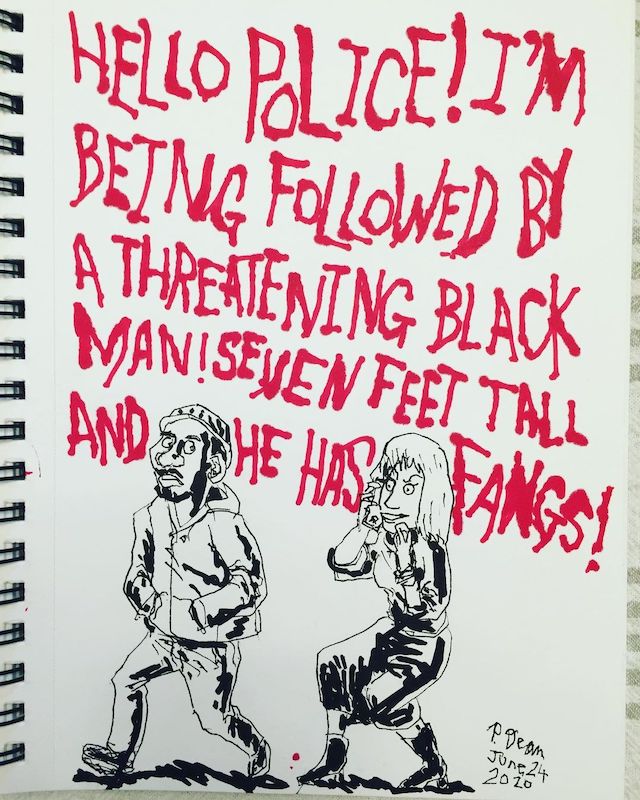 In March, when Covid-19 hit the US, your work became more explicitly political. You made many pieces criticizing how state and local leaders, including the administration of UGA, were approaching the pandemic. When George Floyd was murdered in May, you created a series of pieces about police brutality and anti-black racism. During the runup to the election on November 3rd you did many pieces about voter suppression and the urgent need to have our voices heard.
In March, when Covid-19 hit the US, your work became more explicitly political. You made many pieces criticizing how state and local leaders, including the administration of UGA, were approaching the pandemic. When George Floyd was murdered in May, you created a series of pieces about police brutality and anti-black racism. During the runup to the election on November 3rd you did many pieces about voter suppression and the urgent need to have our voices heard.
If I were battling with a degenerative disease, I suspect I would completely give up on my own sense of civic responsibility. But yours seems to have increased. What is it about the last 6 months that have made you develop such an intense outspoken political voice?
The past year had become the perfect storm of so many terrible elements piling up that it became impossible to ignore. I have a terminal disease, but at least I can see my friends. Wait, I can't. There's a pandemic, but if we work together we can flatten the curve and get it under control. Wait, we can't. Local government is downplaying its severity and the president is throwing out conspiracy theories resulting in half the country believing wearing a mask is tyranny. Police brutality is getting attention with heartbreaking stories backed by video evidence so we should take to the streets and protest. Wait, I can't. On top of the covid risk, the local government has allowed the police to use tear gas which would definitely kill me with my weakened lungs. We should vote the crooked politicians out of office. Wait, it’s not so easy. Voter suppression is happening out in the open with broken voting machines and Republicans threatening to toss out mail-in ballots, which I have to use because I have an illness that makes it difficult to leave the house. Add it all up and I become too angry to sit back and do nothing. It’s extra frustrating that I am unable to protest in person so I have to settle for doing everything from home in a wheelchair.
And Eleanor, you know you you would be fierce if you were faced with a crippling illness. ALS would be terrified of you.
I hope so. I hope that I could have the level of bravery that you show. The amount of advocacy you’ve done is really moving, and inspiring.
Have you connected with other disability activists or other disabled artists?
I've followed other disability activists on twitter and have stayed updated with healthcare news and how it affects my family. I am inspired by their bravado when faced with able-bodied people telling them what they can and can't do. Through social media I have met a wide spectrum of disabled artists, mostly thanks to Mari Naomi. She's a West Coast cartoonist who has created several artist databases of marginalized people including the The Disabled Cartoonists Database. Her work has been very valuable in connecting with this community.
Your recent work feels very personal, and very painful. But you generously share it on twitter and instagram. Is this ever difficult?
I have gone back and forth about how much to publicly share about my experience on social media. On one hand, I have the instinct to shield my friends and family from the effects of the disease and how it’s wrecking my life and my wife and kids’ lives. But I also believe I would be doing a great disservice to the disabled community by sugar coating it. I can't pretend I'm going to recover from this disease and that I feel content with everything going on in the world. So I might as well tell the truth.
I wanted to end with that answer. Life can have so much sweetness. But it can also be incomprehensibly brutal, and painful, and unjust. I believe if we turn away from the awful stuff, we lose a little of what makes us human. Patrick refuses to do that. He is up against deep darkness, but he has not turned away. He is looking the darkness in the face, and he is drawing it. And in sharing his art, he is sharing a little of his tremendous bravery with us. It is an incredible gift.



